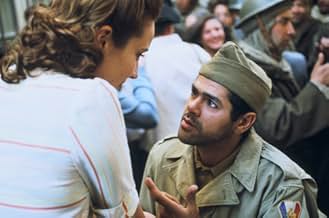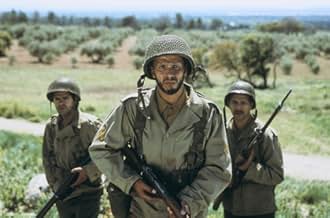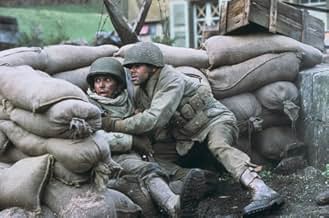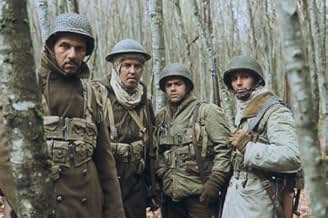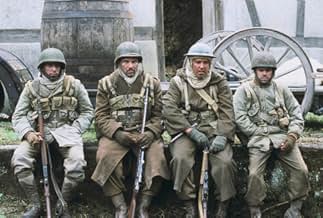AVALIAÇÃO DA IMDb
7,0/10
15 mil
SUA AVALIAÇÃO
Adicionar um enredo no seu idiomaDuring World War II, four North African men enlist in the French army to liberate that country from German oppression, and to fight French discrimination.During World War II, four North African men enlist in the French army to liberate that country from German oppression, and to fight French discrimination.During World War II, four North African men enlist in the French army to liberate that country from German oppression, and to fight French discrimination.
- Direção
- Roteiristas
- Artistas
- Indicado a 1 Oscar
- 9 vitórias e 17 indicações no total
- Direção
- Roteiristas
- Elenco e equipe completos
- Produção, bilheteria e muito mais no IMDbPro
Avaliações em destaque
For the first time this year the Weinstein Company has made something bearable --Hell, actually something good. The film is called Days of Glory (a title strangely reconfigured from Indigènes) and it chronicles a regiment in the war against Nazism, or, as the French call it, "liberty". But, the catch here is that these soldiers, they aren't French: They're Algerian and Morroquian. The film first suffers from superfluous paper-mâché clichés in order to demonstrate racial inequality, not as a subtle character study, but rather as an insolent whole which creates that annoying been-there, done-that feeling. Such a scene occurs when Abdelkader (Sami Bouajila) realizes that not all African troops are getting tomatoes, where as the French are. What does he do? He smashes them so "Nobody can have them". Director Rachid Bouchareb narrative is also first a bit fragmented, jumping from country to country as if they were stones. Eventually, it develops into an assured rhythm which corroborates with the film.
Brilliance in Days of Glory neither comes from ideas nor direction, but rather, through the magisterial acting, prized at Cannes, and small war vignettes. They are gripping and moving, like all war movies should be. These war scenes are powerful, and that is what makes up Days of Glory, because in the end, Days of Glory is one of the few good but flawed war films worth a damn. It has power and it is evident that it uses it wisely and vigorously.
Brilliance in Days of Glory neither comes from ideas nor direction, but rather, through the magisterial acting, prized at Cannes, and small war vignettes. They are gripping and moving, like all war movies should be. These war scenes are powerful, and that is what makes up Days of Glory, because in the end, Days of Glory is one of the few good but flawed war films worth a damn. It has power and it is evident that it uses it wisely and vigorously.
In World War II, the Muslims from French colonies enlist to fight for their motherland France. In the 7th battalion commanded by the tough Sergeant Roger Martinez (Bernard Blancan), the soldier Abdelkader (Sami Bouajila) has leadership with the troop and seeks promotion and recognition from the command; Said Otmari (Jamel Debbouze) is a servile and illiterate private, happy in serving his sergeant; Messaoud Souni (Roschdy Zem) is the sniper of the group and has fallen in a corresponded love with the French Irène (Aurélie Eltvedt); and Yassir (Samy Naceri) is fighting together with his brother to raise some money. Along the campaign in Italy, France and Alsace, they realize that French soldiers are promoted, have better food and have leaves to visit their families, while the Arab soldiers are shamefully discriminated and treated like 2nd ranking soldiers.
"Indigènes" is an excellent movie of war, disclosing an unusual theme: the discrimination of the soldiers from the French colonies in World War II. The anti-Semitism is presented in most of the films about WWII; racism and segregation with the American soldiers has been explored in a couple of movies; but the treatment spent to the Arab soldiers in World War II by France command is the first time that I see in a movie. The screenplay, the direction, the performances, the pace and the cinematography are great and gives a magnificent homage to these forgotten and discriminated heroes. The lack of payment of pension plan to the survivors and families by the French government is another example of the level of intolerance and lack of respect in the world of the present days. In the end, it is a great deception that the beautiful message "Liberty, Equality and Fraternity" is not applicable to the soldiers from the exploited colonies. My vote is eight.
Title (Brazil): "Dias de Glória" ("Days of Glory")
"Indigènes" is an excellent movie of war, disclosing an unusual theme: the discrimination of the soldiers from the French colonies in World War II. The anti-Semitism is presented in most of the films about WWII; racism and segregation with the American soldiers has been explored in a couple of movies; but the treatment spent to the Arab soldiers in World War II by France command is the first time that I see in a movie. The screenplay, the direction, the performances, the pace and the cinematography are great and gives a magnificent homage to these forgotten and discriminated heroes. The lack of payment of pension plan to the survivors and families by the French government is another example of the level of intolerance and lack of respect in the world of the present days. In the end, it is a great deception that the beautiful message "Liberty, Equality and Fraternity" is not applicable to the soldiers from the exploited colonies. My vote is eight.
Title (Brazil): "Dias de Glória" ("Days of Glory")
France 1943. Indigenous Moroccan soldiers still wet behind the ears are called in to the 17th infantry to defend their 'motherland' against the ongoing German occupation. Their goodness and patriotism are unmistakable and Saïd (Jamel Debbouze) remarks how "If I liberate a country, it's my country, even if I've never even been there." Here is a good-hearted contingent of North African soldiers who hope to catch some of the victory's glory, but whom are repeatedly shifted to the backseat because of their name, skin and accent.
There was no way I would miss a film that French president Chirac cites as the sole reason he immediately rectified the pension plan for indigenous veterans, offering them the promise of equality for the law for the first time. Indigènes is puffed full of political correctness with heavy-handed treatment of salient issues such as racism, inequality and intolerance. But we do not mind, because the film so rigorously establishes a brotherhood feeling with our triumvirate of central characters that we find ourselves completely engrossed in their struggle, rooting for them, laughing with them and often crying because of them.
In the front row for sympathy sits Saïd, Yassir, Messaoud and Abdelkader, all inhabited by capable unknown actors with great emotional transparency. Saïd is a kind of clumsy teddy bear who kisses his mom goodbye in Morocco and immediately botches his way through combat, even choking on the victorious scotch and fumbling with the token victor's cigar when the first battle has been won. These are heartbreakingly real people. Arguably even the hard-edged Sergeant elicits a warm response when he unflinchingly takes on the father-role for the contingent he is rough, harsh, cynical but fair. The male ensemble won the Cannes award for 'Best Actor' earlier this year, which solidifies their collective likability and serve as a mark of the film's warm cast centre. If you want to nitpick, it needs to be said that some moments (such as key death scenes), although tragic, inexplicably lack the propelling poignancy to elicit tears. Why this is I do not know, but it ought to be attributed to the film and not the superb performances.
When the squad of wet puppies make their way across the motherland, they are faced with two disturbances: the internal conflicts that arise in the army when it becomes apparent that North African soldiers are not given the same treatment as native French (no tomatoes, no weekend leaves, no promotions and no glory) and the gruesome reality on the battlefield. The former is captured safely but compellingly through little rants, intense stares and cries of "Liberté, Egalité, Fraternité!" all in the token French political spirit. The latter, however, is Indigènes' true goldmine. No description will do the warfare sequences justice; they need to be seen. Think Call of Duty plugged into the silver screen, with epileptic zooming, fast-paced action, gory reality, humming rocket launchers and one massive sense of immediate danger. It nearly puts Steven Spielberg's warmovie fare to shame.
The cinematography channels one storyline from 'Babel', from the epic aerial shots of the craggy hills and desert-laden plains of Morocco to a juxtaposition of lush French soil. Even the French sheets are a great source of awe for the North African soldiers. Much like 'Babel', the film never shies away from blending equal amounts of Arabic and French into the dialogue, something that reinforces the realism.
Indigènes (2006) is an excellent film with strong performances and a strong, political core. Its flaws, however apparent, are generally marginal. The one thing that jumped out and grabbed me, striking me as below average, was the hammy and inexcusably hackneyed score. When Arabic soldiers are fighting for their lives and bleeding in the process, slapping on a dutiful ethnic score that sings and wails like it means business, the film is just preaching to the choir. If I hear an "epic, ethnic" score in a movie like this again, I will probably go out and kill someone either the Arab who is singing, or the stupid Westerner who thinks mainstream audiences need everything spelled-out for them with this mandatory music inclusion.
Aside from this minor misstep, Indigènes is a worthy merit to France's resumé of films, one that will surely be a frontrunner for the Best Foreign Language Film Award at the Oscars next year. Nevermind that this is an excellent and real film, the competent political notions may just be enough to tip things over in its favour.
8 out of 10
There was no way I would miss a film that French president Chirac cites as the sole reason he immediately rectified the pension plan for indigenous veterans, offering them the promise of equality for the law for the first time. Indigènes is puffed full of political correctness with heavy-handed treatment of salient issues such as racism, inequality and intolerance. But we do not mind, because the film so rigorously establishes a brotherhood feeling with our triumvirate of central characters that we find ourselves completely engrossed in their struggle, rooting for them, laughing with them and often crying because of them.
In the front row for sympathy sits Saïd, Yassir, Messaoud and Abdelkader, all inhabited by capable unknown actors with great emotional transparency. Saïd is a kind of clumsy teddy bear who kisses his mom goodbye in Morocco and immediately botches his way through combat, even choking on the victorious scotch and fumbling with the token victor's cigar when the first battle has been won. These are heartbreakingly real people. Arguably even the hard-edged Sergeant elicits a warm response when he unflinchingly takes on the father-role for the contingent he is rough, harsh, cynical but fair. The male ensemble won the Cannes award for 'Best Actor' earlier this year, which solidifies their collective likability and serve as a mark of the film's warm cast centre. If you want to nitpick, it needs to be said that some moments (such as key death scenes), although tragic, inexplicably lack the propelling poignancy to elicit tears. Why this is I do not know, but it ought to be attributed to the film and not the superb performances.
When the squad of wet puppies make their way across the motherland, they are faced with two disturbances: the internal conflicts that arise in the army when it becomes apparent that North African soldiers are not given the same treatment as native French (no tomatoes, no weekend leaves, no promotions and no glory) and the gruesome reality on the battlefield. The former is captured safely but compellingly through little rants, intense stares and cries of "Liberté, Egalité, Fraternité!" all in the token French political spirit. The latter, however, is Indigènes' true goldmine. No description will do the warfare sequences justice; they need to be seen. Think Call of Duty plugged into the silver screen, with epileptic zooming, fast-paced action, gory reality, humming rocket launchers and one massive sense of immediate danger. It nearly puts Steven Spielberg's warmovie fare to shame.
The cinematography channels one storyline from 'Babel', from the epic aerial shots of the craggy hills and desert-laden plains of Morocco to a juxtaposition of lush French soil. Even the French sheets are a great source of awe for the North African soldiers. Much like 'Babel', the film never shies away from blending equal amounts of Arabic and French into the dialogue, something that reinforces the realism.
Indigènes (2006) is an excellent film with strong performances and a strong, political core. Its flaws, however apparent, are generally marginal. The one thing that jumped out and grabbed me, striking me as below average, was the hammy and inexcusably hackneyed score. When Arabic soldiers are fighting for their lives and bleeding in the process, slapping on a dutiful ethnic score that sings and wails like it means business, the film is just preaching to the choir. If I hear an "epic, ethnic" score in a movie like this again, I will probably go out and kill someone either the Arab who is singing, or the stupid Westerner who thinks mainstream audiences need everything spelled-out for them with this mandatory music inclusion.
Aside from this minor misstep, Indigènes is a worthy merit to France's resumé of films, one that will surely be a frontrunner for the Best Foreign Language Film Award at the Oscars next year. Nevermind that this is an excellent and real film, the competent political notions may just be enough to tip things over in its favour.
8 out of 10
There's two types of French film .
1 ) The sort that is beloved by Cahiers Du Cinema that often feature people standing about talking about existentialist themes and often don't find a market outside France
2 ) The sort that is despised by Cahiers Du Cinema that often feature action and plot and appeal to an international market
DAYS OF GLORY is certainly in the second camp . The problem is that it's a bit too international . The theme of colonial soldiers fighting for the mother country could have easily have featured British dominion troops fighting in the Boer war , of Indian troops fighting at El Alamein or even of black Americans fighting in the second world war . Some people on this page have criticised this movie as not being a Gallic version of GLORY and you can see their point . There's little in the way of an idiosyncratic voice
Worse still despite the subtitles you could easily be watching a war film that was made in Hollywood . Much of the plot could have easily been lifted from Sam Fuller's THE BIG RED ONE as the story jumps from North Africa , Italy and eventually France . It's also impossible not to notice that the final climatic battle owes a lot to the climax of SAVING PRIVATE RYAN . Perhaps that's why DAYS OF GLORY received high praise down to its familiar story that English speaking fans of war films have seen so many times before ?
It could have been much worse though . On a technical level it's a competent enough movie and it doesn't go overboard that the Goumier troops are some how slaves press-ganged in to joining the Free French forces but it does effectively ignore the sometimes horrendous reputation Goumier troops had in Axis territories where women are concerned . The 1960 Italian film TWO WOMEN goes in to this in detail and you can imagine that's why the protagonists service in Italy is skated over very slightly . One wonders if the producers might have been worried about an international audience being alienated by bringing up the subject in any length ? As it it stands DAYS OF GLORY is a good enough war film though very traditional
1 ) The sort that is beloved by Cahiers Du Cinema that often feature people standing about talking about existentialist themes and often don't find a market outside France
2 ) The sort that is despised by Cahiers Du Cinema that often feature action and plot and appeal to an international market
DAYS OF GLORY is certainly in the second camp . The problem is that it's a bit too international . The theme of colonial soldiers fighting for the mother country could have easily have featured British dominion troops fighting in the Boer war , of Indian troops fighting at El Alamein or even of black Americans fighting in the second world war . Some people on this page have criticised this movie as not being a Gallic version of GLORY and you can see their point . There's little in the way of an idiosyncratic voice
Worse still despite the subtitles you could easily be watching a war film that was made in Hollywood . Much of the plot could have easily been lifted from Sam Fuller's THE BIG RED ONE as the story jumps from North Africa , Italy and eventually France . It's also impossible not to notice that the final climatic battle owes a lot to the climax of SAVING PRIVATE RYAN . Perhaps that's why DAYS OF GLORY received high praise down to its familiar story that English speaking fans of war films have seen so many times before ?
It could have been much worse though . On a technical level it's a competent enough movie and it doesn't go overboard that the Goumier troops are some how slaves press-ganged in to joining the Free French forces but it does effectively ignore the sometimes horrendous reputation Goumier troops had in Axis territories where women are concerned . The 1960 Italian film TWO WOMEN goes in to this in detail and you can imagine that's why the protagonists service in Italy is skated over very slightly . One wonders if the producers might have been worried about an international audience being alienated by bringing up the subject in any length ? As it it stands DAYS OF GLORY is a good enough war film though very traditional
Days of Glory (Indigénes) can boast that it was the most important if not the most successful of the five films in the Oscars' Best Foreign Film category. After French Premier Jacques Chirac saw the film, he agreed to compensate all North Africans who fought in World War II by unfreezing their pensions, a result the director Rachid Bouchareb worked hard to achieve. Though conventional in its technique and lacking in any real character development, Days of Glory, a French Moroccan Algerian co-production, is an involving and heartfelt film whose outstanding ensemble cast won the award for Best Actor at the 2006 Cannes Film Festival.
The film depicts a group of North African volunteers who enlist in the French army to support the French resistance against the Nazis during World War II. The fact that they are fighting for a lesser group of colonial oppressors against a more virile one does not enter their mind and they are ecstatic with the thrill of being on French soil for the first time. Their shabby treatment, however, by bigots in the French army who deny them the privileges that they take for granted becomes the centerpiece of the film. Unlike the French, the North African recruits are not granted leave to visit their families, are not promoted, and are not even allowed tomatoes with their dinner.
The film opens in 1943 as the enlisted men say goodbye to their families in Algeria, Morocco, and Senegal to join the fight against the Germans. Bouchareb follows four men: Said (James Debbouze), a young Algerian is moved to enlist by a recruiter's sloganeering and his own desire to escape his economic hardship; Yassir (Samy Naceri) who joins in Morocco even though he cannot help being bitter toward the French government that killed his family in the name of pacification.
We later meet Messaoud (Roschdy Zem), a solid marksman who falls for a young French woman but their correspondence is intercepted and censored by the French and his "no luck" tattoo on his neck turns out to be prophetic. The strongest character in the film is Abdelkader (Sami Bouajila), whose outspokenness against the injustice shown to North African soldiers keeps him from being promoted but earns him a strong following. Said develops a close relationship with Sergeant Martinez (Bernard Blancan), a by the book Captain who nonetheless speaks up for the dedication of his men but when Said happens to suggest that Martinez is part Arab, their relationship ends swiftly and dramatically.
The high point of the film is the battle for a village in Alsace. It is a tense, emotionally harrowing sequence that is the equal of anything in Saving Private Ryan. Days of Glory has a strong point of view but is not didactic. It simply lets us see the face of discrimination against Arab soldiers during the war and the tension that arose in the French army because of it, a harbinger of colonial wars and urban tensions to follow. While the film unfortunately ends on a clichéd note, it is still quite moving and makes sure the brave soldiers from North Africa are acknowledged for their contribution, sadly overlooked these many years.
The film depicts a group of North African volunteers who enlist in the French army to support the French resistance against the Nazis during World War II. The fact that they are fighting for a lesser group of colonial oppressors against a more virile one does not enter their mind and they are ecstatic with the thrill of being on French soil for the first time. Their shabby treatment, however, by bigots in the French army who deny them the privileges that they take for granted becomes the centerpiece of the film. Unlike the French, the North African recruits are not granted leave to visit their families, are not promoted, and are not even allowed tomatoes with their dinner.
The film opens in 1943 as the enlisted men say goodbye to their families in Algeria, Morocco, and Senegal to join the fight against the Germans. Bouchareb follows four men: Said (James Debbouze), a young Algerian is moved to enlist by a recruiter's sloganeering and his own desire to escape his economic hardship; Yassir (Samy Naceri) who joins in Morocco even though he cannot help being bitter toward the French government that killed his family in the name of pacification.
We later meet Messaoud (Roschdy Zem), a solid marksman who falls for a young French woman but their correspondence is intercepted and censored by the French and his "no luck" tattoo on his neck turns out to be prophetic. The strongest character in the film is Abdelkader (Sami Bouajila), whose outspokenness against the injustice shown to North African soldiers keeps him from being promoted but earns him a strong following. Said develops a close relationship with Sergeant Martinez (Bernard Blancan), a by the book Captain who nonetheless speaks up for the dedication of his men but when Said happens to suggest that Martinez is part Arab, their relationship ends swiftly and dramatically.
The high point of the film is the battle for a village in Alsace. It is a tense, emotionally harrowing sequence that is the equal of anything in Saving Private Ryan. Days of Glory has a strong point of view but is not didactic. It simply lets us see the face of discrimination against Arab soldiers during the war and the tension that arose in the French army because of it, a harbinger of colonial wars and urban tensions to follow. While the film unfortunately ends on a clichéd note, it is still quite moving and makes sure the brave soldiers from North Africa are acknowledged for their contribution, sadly overlooked these many years.
Você sabia?
- CuriosidadesThe main actors, all of North African descent, did not know of France's discrimination towards foreign soldiers serving in the French army during World War 2 until filming began.
- Erros de gravaçãoIn the scene when the African soldiers raise the French tricolor over the Italian mountain top, the flag they use is polyester (i.e. a contemporary flag). World War II troops would have used a cotton flag.
- ConexõesFeatured in Indigenes: Le making of (2006)
- Trilhas sonorasLe lac des cygnes
Composed by Pyotr Ilyich Tchaikovsky
Principais escolhas
Faça login para avaliar e ver a lista de recomendações personalizadas
- How long is Days of Glory?Fornecido pela Alexa
Detalhes
Bilheteria
- Orçamento
- € 14.500.000 (estimativa)
- Faturamento bruto nos EUA e Canadá
- US$ 320.700
- Fim de semana de estreia nos EUA e Canadá
- US$ 10.996
- 10 de dez. de 2006
- Faturamento bruto mundial
- US$ 22.963.701
- Tempo de duração
- 2 h 3 min(123 min)
- Cor
- Mixagem de som
- Proporção
- 2.35 : 1
Contribua para esta página
Sugerir uma alteração ou adicionar conteúdo ausente


